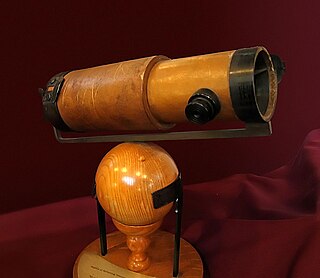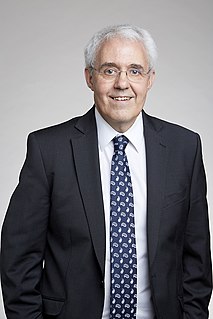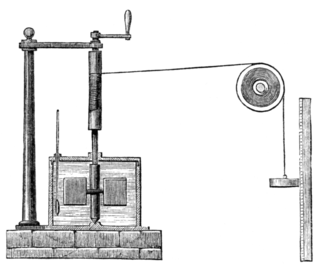Related Research Articles

Sir Fred Hoyle FRS (24 June 1915 – 20 August 2001) was an English astronomer who formulated the theory of stellar nucleosynthesis and was one of the authors of the influential B2FH paper. He also held controversial stances on other scientific matters—in particular his rejection of the "Big Bang" theory, a term coined by him on BBC radio, and his promotion of panspermia as the origin of life on Earth. He also wrote science fiction novels, short stories and radio plays, and co-authored twelve books with his son, Geoffrey Hoyle. He spent most of his working life at the Institute of Astronomy at Cambridge and served as its director for six years.

Nalin Chandra Wickramasinghe is a Sri Lankan-born British mathematician, astronomer and astrobiologist of Sinhalese ethnicity. His research interests include the interstellar medium, infrared astronomy, light scattering theory, applications of solid-state physics to astronomy, the early Solar System, comets, astrochemistry, the origin of life and astrobiology. A student and collaborator of Fred Hoyle, the pair worked jointly for over 40 years as influential proponents of panspermia. In 1974 they proposed the hypothesis that some dust in interstellar space was largely organic, later proven to be correct.

Jayant Vishnu Narlikar is an Indian astrophysicist and emeritus professor at the Inter-University Centre for Astronomy and Astrophysics (IUCAA). He developed with Sir Fred Hoyle the conformal gravity theory, known as Hoyle–Narlikar theory. It synthesises Albert Einstein's theory of relativity and Mach's principle. It proposes that the inertial mass of a particle is a function of the masses of all other particles, multiplied by a coupling constant, which is a function of cosmic epoch.

Carlos Silvestre Frenk is a Mexican-British cosmologist and the Ogden Professor of Fundamental Physics at Durham University. His main interests lie in the fields of cosmology, galaxy formation and computer simulations of cosmic structure formation.

The Michael Faraday Medal and Prize is a gold medal awarded annually by the Institute of Physics in experimental physics. The award is made "for outstanding and sustained contributions to experimental physics." The medal is accompanied by a prize of £1000 and a certificate.

Charles L. Bennett is an American observational astrophysicist. He is a Bloomberg Distinguished Professor, the Alumni Centennial Professor of Physics and Astronomy and a Gilman Scholar at Johns Hopkins University. He is the Principal Investigator of NASA's highly successful Wilkinson Microwave Anisotropy Probe (WMAP).

The Max Born Medal and Prize is a scientific prize awarded yearly by the German Physical Society (DPG) and the British Institute of Physics (IOP) in memory of the German physicist Max Born, who was a German-Jewish physicist, instrumental in the development of quantum mechanics. It was established in 1972 after the death of Born in 1970, and first awarded in 1973.

The Isaac Newton Medal and Prize is a gold medal awarded annually by the Institute of Physics (IOP) accompanied by a prize of £1,000. The award is given to a physicist, regardless of subject area, background or nationality, for outstanding contributions to physics. The award winner is invited to give a lecture at the Institute. It is named in honour of Sir Isaac Newton.
The Nevill Mott Medal and Prize is an award presented in selected years by the Institute of Physics in the United Kingdom, for distinguished research in condensed matter or materials physics. It was first established in 1997 thanks to a donation of Sir Nevill Mott's family. Sir Nevill Mott was one of the outstanding British condensed matter theorists and won a Nobel Prize in Physics in 1977. He died in 1996. The award consists of a silver medal and a prize of £1000.
George Petros Efstathiou is a British astrophysicist who is Professor of Astrophysics (1909) at the University of Cambridge and was the first Director of the Kavli Institute for Cosmology at the University of Cambridge from 2008 to 2016. He was previously Savilian Professor of Astronomy at the University of Oxford.

The Edward Appleton Medal and Prize is awarded by the Institute of Physics for distinguished research in environmental, earth or atmospheric physics. Originally named after Charles Chree, the British physicist and former President of the Physical Society of London, it was renamed in 2008 to commemorate Edward Victor Appleton, winner of the Nobel prize for proving the existence of the ionosphere.
The Fernand Holweck Medal and Prize is a major European prize for Physics awarded jointly every year by the British Institute of Physics (IOP) and the Société Française de Physique (SFP). It is one of the four Grand Prix of the SFP and one of the four International Bilateral Awards of the IOP, consisting of a gold medal and a 3000€ cash prize.
The Katharine Burr Blodgett Medal and Prize is a gold medal awarded annually by the Institute of Physics to "recognise contributions to the organisation or application of physics in an industrial or commercial context." The medal is accompanied by a prize of £1000.

Anthony Raymond Bell is Professor of Physics at the University of Oxford and the Rutherford Appleton Laboratory. He is a Senior Research Fellow at Somerville College, Oxford.

Sheila Rowan is a Scottish physicist and academic, who is Professor of Physics and Astronomy at the University of Glasgow in Scotland, and director of its Institute for Gravitational Research since 2009. She is known for her work in advancing the detection of gravitation waves. In 2016, Rowan was appointed the (part-time) Chief Scientific Advisor to the Scottish Government.

Hiranya Vajramani Peiris is a British astrophysicist at University College London and Stockholm University, best known for her work on the cosmic microwave background radiation. She was one of 27 scientists who received the Breakthrough Prize in Fundamental Physics in 2018 for their "detailed maps of the early universe."
The Clifford Paterson Medal and Prize is awarded by the Institute of Physics. It was established in 1981 and named after Clifford Copland Paterson. The prize is awarded each year for exceptional early career contributions to the application of physics in an industrial or commercial context. The medal is bronze and is accompanied by a prize of £1000 and a certificate.

The James Joule Medal and Prize is awarded by the Institute of Physics. It was established in 2008, and was named in honour of James Prescott Joule, British physicist and brewer. The award is made for distinguished contributions to applied physics. The medal is silver and is accompanied by a prize of £1000.
The Institute of Physics awards numerous prizes to acknowledge contributions to physics research, education and applications. It also offers smaller specific subject-group prizes, such as for PhD thesis submissions.
The Buchalter Cosmology Prize, established in 2014, is a prestigious annual prize bestowed by Dr. Ari Buchalter.
References
- ↑ "Fred Hoyle Medal and Prize". Institute of Physics. Retrieved 24 January 2020.
- ↑ "Fred Hoyle medal recipients". Institute of Physics.
- ↑ "2022 Fred Hoyle Medal and Prize". 24 Oct 2022.
- ↑ "Gilles Chabrier, recipient of the 2019 Fred Hoyle Medal and Prize awarded by Institute of Physics (IOP)". ENS de Lyon. 3 July 2019.
- ↑ "Exeter experts awarded prestigious Institute of Physics medals". University of Exeter. 2 July 2019.
- ↑ Kumara, Sisira (13 July 2018). "Two Sri Lankan Scientists Win Institute of Physics Awards for the Year 2018". Sri Lankan Scientist.
- ↑ "Professor Hiranya Peiris wins prestigious Fred Hoyle IOP Medal and Prize". UCL.
- ↑ Mannervik, Sven (16 August 2018). "Hiranya Peiris receives Fred Hoyle Medal and Prize". Fysikums blogg. Stockholme University.
- ↑ "Cardiff academics pick up prestigious physics awards". Cardiff University. 3 July 2017.
- ↑ Gaal, Rachel (5 July 2016). "Institute of Physics Awards go to Two APS Fellows". American Physical Society.
- ↑ "Physics accolades for STFC scientists". WIRED GOV LTD. 2 July 2014.
- ↑ "Early Universe research wins prize". Lancaster University. 5 July 2012.
- ↑ Reeves, Danielle (10 October 2007). "Success for Imperial physicists at prestigious awards". Imperial College London.